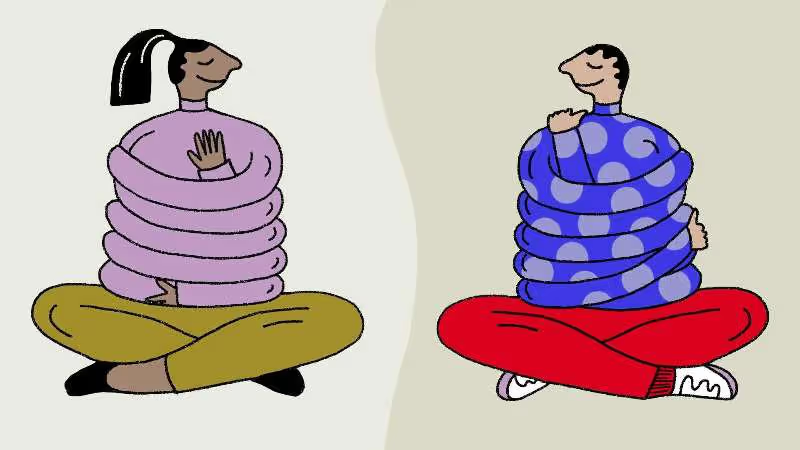Shall We Begin?
Where did we get the idea that we have to learn how to love all on our own? Have you ever ended a relationship because you needed to “work on yourself?” Have you ever said “I need to learn how to love myself before I can love anyone else—and before I can learn how to be loved?
Western culture is obsessed with the exhortation of individualism. In the past few years, the lexicon of the “Self”—self-love, self-care, self-made, the selfie, etc.—has sparked intense debate. Has “self-love” become a marketing term so that beauty brands can sell more products under the guise of wellness? Is self-care making us more self-critical? Is Kylie Jenner really the youngest “self-made” billionaire if she started her business with family money and fame? Does a “selfie” show the world our most empowered self or does it present a better-lit and maybe even slightly tweaked version of how we think we’d like to look? When people say “love thyself,” I wonder, which one?
While the idea of selfhood is not new, different cultures map the self on a continuum: unique or varied, separate or together, independent or conformist. And our ideas about the self are evolving. In the west, we tend to see the self as a separate entity with clear boundaries that delineate an independent identity. This vision of the self is comprised of internal ruminations about confidence, doubt, happiness, failure, ability, disability, and privilege or lack thereof. But the self is also entangled in a cosmic connection with the people around us and with social, political, and economic structures. We don’t just learn to love ourselves by ourselves. It’s a classic chicken or the egg scenario: in order to love another, we must love ourselves. In order to love ourselves, we must allow ourselves to be loved by others. And we must recognize that negative self-esteem is riddled with societal messages about who is lovable, laudable, or loathsome.
It can be wonderful to be alone, to give our body a massage, to cook ourselves a delicious meal for one, but this isn’t self-love, it’s self-reliance and self-sufficiency. Self-love, on the other hand, is closer to my colleague Terry Real’s explanation of self-esteem, our ability to see ourselves as a flawed individual and still hold ourselves in high regard. Self-love is the ability to not fall into a puddle of contempt even when we mess up. It’s trying new things knowing that we could fail, without thinking of ourselves, therefore, as failures. Can we take that understanding and self-compassion into our connections with others?
On my way to the airport recently, I realized I had left my passport, wallet, and computer at home. My multiple selves instantly began a cacophony in my head, how could you do this? You’re going to miss your flight. And then a new voice emerged: Perel, what a good thing this is happening to you in your sixties. This was the voice I tuned into.
Had this scenario happened thirty years ago, I’d be mercilessly beating myself up. I would have said to myself what the hell is wrong with you? You’re so stupid. Go hide. But this new voice said you made a mistake. It happens. Now what? I picked up the phone and called my assistant, a travel agent, my husband, and a friend to see if she wanted to grab coffee with the new free time I found myself with. For me, this is self-love. And look how many people it involved.
For this reason, I also resist the term “self-made”—that mentality of “if I make it, I did it on my own and if I end up on the street, I only have myself to blame.” Human beings are simultaneously dependent and self-reliant. When I write a book, I start with the acknowledgments, because without those people, I couldn't have written the book. I'm massively dependent on the expertise, help, presence, and love of others. We all are.
Self-love is less about the ability to withstand loneliness or establish independence and more about awareness and acceptance of our incompleteness. It’s about letting others love us even when we feel unlovable because their version of us is often kinder than our own.
Let’s Turn the Lens on You
What does self-love look like for you? Try asking yourself the following questions:
- Can I acknowledge that I messed up without telling myself I’m a mess?
- Can I practice regret without falling into an abyss?
- Can I take responsibility without blaming myself?
- Can I apologize for a mistake instead of hoping everyone will just move on?
- Can I acknowledge a time when I could have been a better leader in my own life?
- Can I release myself from the shame of having not responded sooner to someone so that I can finally reach out?
- Can I accept that I will be okay even if someone who hurt me—a parent, former partner, friend, or stranger—never acknowledges the pain they caused?
- Can I let someone treat me for a coffee, dinner, or movie without feeling guilty?
- Can I accept help from another without jumping to the conclusion that they want something from me?
- Can I hold my point of view without being validated for it?
More From Esther
Why Eroticism Should Be Part of Your Self-Care Plan
Tune into your body and let it teach you what you like, don’t like, and what you don’t know yet.
Though the inbox has mostly replaced the mailbox, letters remain an essential part of my life. Here’s how to incorporate letter writing into yours.
Conversation Starters
A compendium of highly recommended sources of inspiration and information.
I’m Reading:
- “An Essay Concerning Human Understanding” by John Locke
- Need to Keep Gen Z Workers Happy? Hire a ‘Generational Consultant’ by Jazmine Hughes (New York Times)
- “The ‘Dating Market’ Is Getting Worse” by Ashley FettersKaitlyn Tiffany (The Atlantic)
I’m Watching:
- Terry Real on Self-Esteem and Depression
- “No Subject” by Miriam Aziz
- “End Game” a documentary about end of life care
I’m Listening To:
- Adam Grant on how to deal with jerks at work






.svg)





